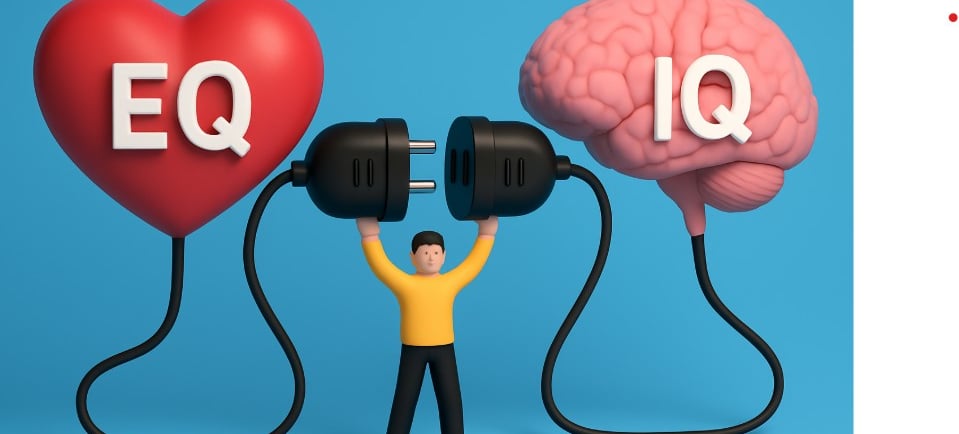The Missing Subject: Teaching the Heart in a Head-Heavy Curriculum
In a world driven by grades and performance, emotional intelligence is the missing link in student development. It's time schools embed it into the core curriculum to support mental health, academic resilience, and life readiness.
Yirgalem M. Habte, PhD.
7/19/20253 min read


In a world driven by grades and performance, emotional intelligence is the missing link in student development. It's time schools embed it into the core curriculum to support mental health, academic resilience, and life readiness.
What Does It Truly Mean to Educate a Child?
For decades, our schools have been shaped by a singular pursuit: academic achievement. From test prep to GPA rankings, success has been defined by what students know and how well they perform. But education is more than the mastery of facts, it’s the shaping of a whole human being. And that requires something we rarely teach; emotional intelligence (EI).
Emotional intelligence is the ability to recognize, understand, and regulate one’s own emotions while also responding to others with empathy and sound judgment. It is the foundation for resilience, healthy relationships, responsible decision-making, and mental well-being. Unlike IQ, emotional intelligence is not inherited. Yet, despite its lifelong benefits, most schools still treat it as extracurricular, optional, or secondary.
The Cost of Emotional Neglect: A True Story
On October 23, 1990, The New York Times reported an incident that shocked the nation. Jason H., a 17-year-old honors student in Florida, brought a butcher knife to school and stabbed his physics teacher after receiving a B- on a quiz. Jason had long been seen as the model student, ambitious, high-achieving, and university-bound. His dream was to become a medical doctor, a profession that not only demands intellectual precision but also extraordinary emotional intelligence; empathy, self-regulation, and sound decision-making under stress. And yet, Jason had never been taught how to manage his own emotions. Despite all his academic success, he lacked the basic emotional skills necessary to process failure, ask for help, or navigate inner pressure. The grade triggered a temporary psychotic break, one rooted in perfectionism, emotional isolation, and a lack of coping tools. Psychologists concluded that Jason, though intellectually gifted, had never developed the emotional foundation to support the weight of his ambition. His story is more than tragic. It is a powerful indictment of an educational system that teaches algebra and physics, but not how to manage fear, failure, or frustration.
What Schools Teach and What They Don’t
Today’s students face unprecedented levels of stress, social complexity, and mental health challenges. Yet, most school curricula focus solely on academic content, with minimal attention to:
Self-awareness and emotional regulation
Managing anxiety and disappointment
Resolving conflicts peacefully
Building empathy and compassion
Coping with trauma or chronic stress
These aren’t “soft skills.” They are life-preserving, success-enabling skills, just as essential as reading and math.
Why Emotional Intelligence Deserves a Place in the Core Curriculum
The evidence is clear: when schools make space for emotional intelligence, the entire learning environment improves. Students feel safer, perform better, and grow stronger. Here’s how:
Improved Behavior and Self-Discipline
Students with emotional awareness can manage impulses, remain calm under pressure, and navigate challenges more effectively.Reduction in Bullying and Violence
Empathy-based education reduces aggression and increases students’ ability to resolve conflicts nonviolently.Stronger Mental Health Outcomes
Students who learn to process and communicate their emotions are less likely to suffer from anxiety, depression, or self-harm.Boosted Academic Achievement
Emotionally intelligent students show greater motivation, engagement, and resilience, which are key drivers of academic success.Readiness for Life Beyond School
In the workforce and in relationships, emotional intelligence is often the defining factor of personal and professional success.
The Stakes Are Too High to Ignore
Jason H.’s story is not an isolated case. It is a symbol of what happens when our educational priorities neglect the emotional realities of students’ lives. When we treat students as minds without emotions, we leave them unprepared for the personal and professional challenges that lie ahead.
Conclusion: Educating the Head and the Heart
Education is not just about preparing students for college or careers; it is about preparing them for life. That means teaching them how to manage themselves, connect with others, and thrive through adversity. By embedding emotional intelligence into the curriculum, we nurture both the cognitive and emotional capacities of our students. We help them become not just smarter learners, but healthier, more compassionate, and more capable human beings. Let’s ensure the classroom reflects the full spectrum of what it means to be human.
Reference
Honan, W. H. (1990, October 23). Honor Student Stabs Teacher After Getting B on Quiz. The New York Times. https://www.nytimes.com/1990/10/23/us/honor-student-stabs-teacher-after-getting-b-on-quiz.html
